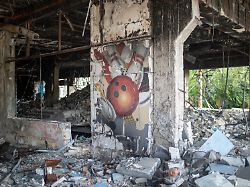Joint declaration fails
Scandal over Ukraine war at summit in Brussels
07/18/2023, 8:24 p.m
At a meeting with Latin American and Caribbean countries, the EU hopes that all participants can agree on a resolution against Russia’s invasion. But countries allied with Moscow thwart the plan. Only an indirect reference is noted at the end.
The EU’s first major summit meeting with Latin American and Caribbean countries in eight years has been overshadowed by disputes over a declaration on the Ukraine war. At the two-day meeting in Brussels, countries allied with Russia such as Nicaragua, Venezuela and Cuba managed to ensure that the text contained no explicit condemnation of the war and that Russia was not even mentioned.
In the end, Nicaragua did not even want to accept a minimal compromise. According to diplomats, the reason was that there was talk of a “war against Ukraine” and the “need for a just and sustainable peace”. The aim of the EU was to send a clear message to Russian President Vladimir Putin with the summit declaration. It should be made clear to the latter that he is increasingly isolated in the world community and must fear further economic disadvantages if the war of aggression continues.
The hope was that powerful Latin American countries like Brazil would influence smaller states at the summit meeting to persuade them to condemn Russia’s war of aggression. In the end, it could only be jointly determined that the ongoing war against Ukraine is causing immense human suffering and, for example, increasing existing vulnerabilities in the global economy.
Nicaragua also voted against the UN resolution
The fact that the majority of the summit participants condemned Russia for the war of aggression was made clear only indirectly with a reference to the corresponding resolutions of the United Nations General Assembly. In them, Russia was last asked to withdraw from Ukraine in February. 141 of the 193 member states of the United Nations voted in favor in February.
At the time, Central American Nicaragua was one of only seven countries to vote against the adoption of the resolution. Cuba abstained and Venezuela did not vote. Top political representatives from 60 countries took part in the summit in Brussels – from South America, among others, Brazil’s President Luiz Inácio Lula da Silva and Argentina’s President Alberto Fernández.
